湖北省八校第一次联考英语试题
- 格式:docx
- 大小:54.01 KB
- 文档页数:12

湖北省八校高三英语第一次联考(扫描版)英语综合测试答案及评分标准英语听力部分,该部分共两节,满分30分。
第一节(共5小题,每小题1.5分,满分7.5分)听下面5段对话。
每段对话后有一个小题,从题中所给的A、B、C三个选项中选出最佳选项,并标在试卷的相应位置。
听完每段对话后,你都有10秒钟的时间来回答有关小题和阅读下一小题。
每段对话仅读一遍。
Test 1M: I’ve traveled to Rome, Paris, London and New York, but I prefer living in San Francisco.W: of course. That’s where your home is and your friends live.M: Very true.Test 2W: What did you do when I was away?M: Look at the windows. They are clean, aren’t they?Test 3W: I’m sorry to have kept you waiting.M: That’s quite all right. I have been here for just half an hour.Test 4W: Marilyn seems happy with her grade.M: Happy? She could hardly control herselfTest 5W: I’m afraid you’ve been working too hard. You should take a vacation.M: Tell that to a pile of papers on my desk.第二节(共15小题;每小题1.5分,满分22.5分)听下面5段对话或独白。
每段对话或独白后有几个小题,从题中所给的A、B、C三个选项中选出最佳选项,并标在试卷的相应位置。
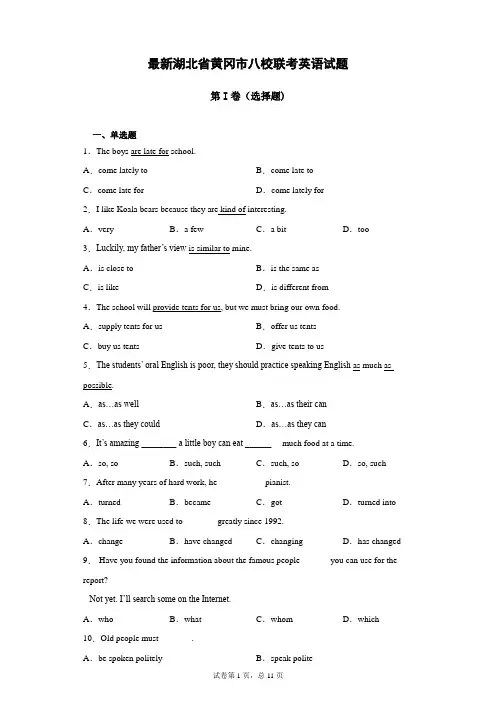
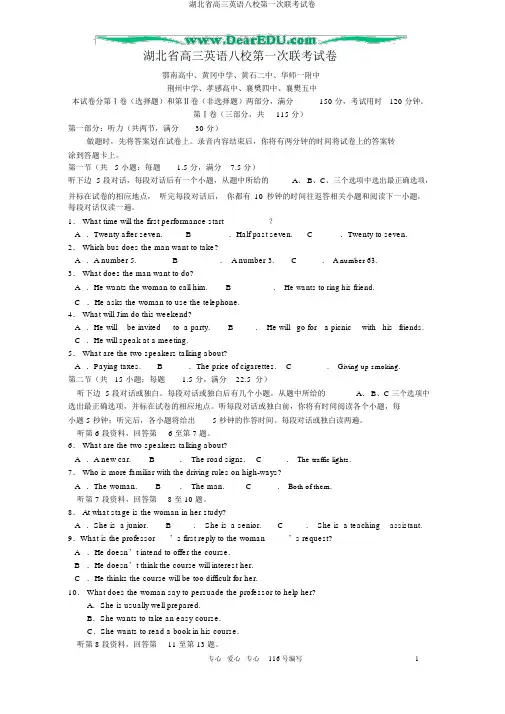
湖北省高三英语八校第一次联考试卷鄂南高中、黄冈中学、黄石二中、华师一附中荆州中学、孝感高中、襄樊四中、襄樊五中本试卷分第Ⅰ卷(选择题)和第Ⅱ卷(非选择题)两部分,满分150 分,考试用时120 分钟。
第Ⅰ卷(三部分,共115 分)第一部分:听力(共两节,满分30 分)做题时,先将答案划在试卷上。
录音内容结束后,你将有两分钟的时间将试卷上的答案转涂到答题卡上。
第一节(共 5 小题:每题 1.5 分,满分7.5 分)听下边 5 段对话,每段对话后有一个小题,从题中所给的A、 B、C、三个选项中选出最正确选项,并标在试卷的相应地点,听完每段对话后,你都有10 秒钟的时间往返答相关小题和阅读下一小题,每段对话仅读一遍。
1. What time will the first performance start?A.Twenty after seven.B.Half past seven.C.Twenty to seven.2. Which bus does the man want to take?A.A number 5.B.A number 3.C.A number 63.3. What does the man want to do?A.He wants the woman to call him.B.He wants to ring his friend.C.He asks the woman to use the telephone.4. What will Jim do this weekend?A.He will be invited to a party.B.He will go for a picnic with his friends. C.He will speak at a meeting.5. What are the two speakers talking about?A.Paying taxes.B.The price of cigarettes.C.Giving up smoking.第二节(共15 小题;每题 1.5 分,满分22.5 分)听下边 5 段对话或独白。
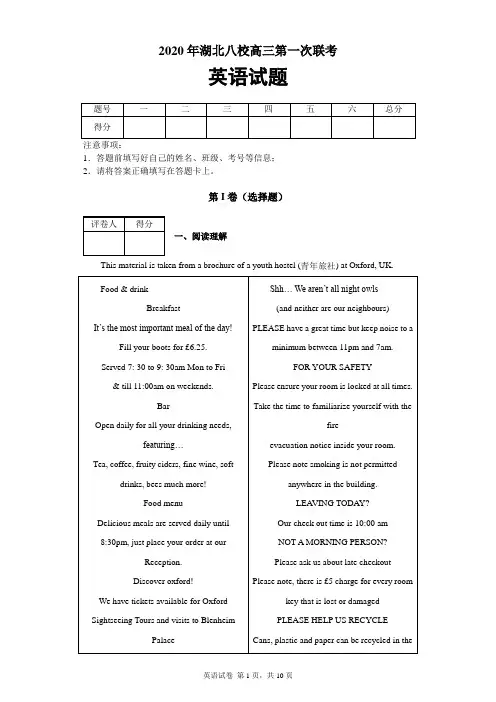
2020年湖北八校高三第一次联考英语试题注意事项:1.答题前填写好自己的姓名、班级、考号等信息; 2.请将答案正确填写在答题卡上。
第I 卷(选择题)一、阅读理解This material is taken from a brochure of a youth hostel (青年旅社) at Oxford, UK.1.On which day does this hostel still serve breakfast at 10:30?A.Monday B.ThursdayC.Wednesday D.Saturday.2.What can travelers do in this hostel?A.Throwing a party at midnightB.Smoking in the toilet.C.Having breakfast for freeD.Connecting WIFI on the ground floor.3.What time are travelers normally expected to check out?A.10:00am. B.7:00am.C.9:30am. D.11:00am.I always wanted to be extraordinarily good at something. Not just as in, “Great job, Jimbo!” No, I wanted to be best-in-class, awe-inspiring, tiptop: a world-famous genius, like Michael Phelps, or Mark Zuckerberg.Unfortunately, my version of reality did not quite line up with this delusional vision. I was a good swimmer, but I peaked at the collegiate State Championships level. My academic record was pretty solid, but I never would have made it into one of those ivy-league schools.Though I rose to above-average status in a couple of areas, the disappointing truth was that I would never amount to anything more than a mid-sized fish in a small pond. God apparently had other plans.What drove me crazy, though, was the superstar talent thrown in my face at every turn. Some folks just seemed to get an unfair intensive dose (剂量) of it. Why couldn’t I be like Bernie Williams, the famed New York Yankees player who also happens to be a world-class jazz guitar virtuoso (艺术大师)?Some say greatness is simply a function of putting in the practice time. Around ten thousand hours, to be precise, according to author Malcolm Gladwell. I don’t question thethe ory of devoting extraordinary efforts to developing one’s expertise, but it seems that raw talent is equally important. You either have it or you don’t.I’ve heard that as people approach middle age, their life satisfaction increases because they begin to accept the gap between the expectations for themselves and the reality. After a few decades of frustration without the desired results, we eventually come to terms with how our lives turned out, even if it falls far short of our idealized youthful expectations.Hope bends, it seems.4.What does the word “delusional” in Para. 2 most probably mean?A.Imaginary. B.Realistic.C.Disappointing. D.Material.5.In the passage, the writer thinks of himself as ________.A.a world-famous genius B.a mid-sized fish in a small pondC.a world-class virtuoso D.a student in an ivy-league school 6.According to the writer, what makes “greatness”?A.Extraordinary efforts. B.Ten thousand hours of practice. C.Raw talent. D.Talent and time.7.Which of the following might be the best title?A.Hope Bends B.Frustrating DecadesC.Practice Works D.Youthful ExpectationsLego is considering a brick (积木) rental plan in an attempt to cut down on plastic waste. The Danish toymaker has promised to make all its bricks from sustainable (可持续的) sources by 2030 and is investing significant resources into finding alternatives.Tim Brooks, vice-president responsible for sustainability, said the company was “totally open” to the idea of a product rental plan but admitted that lost pieces could prod uce a significant problem. “What are the chances of giving them to an eight-year-old child and getting them all back again?” Mr. Brooks added.“There is a lot of technical thinking that needs to be done. We are right at beginning of that.” Mr. Brooks said Lego was exploring several ideas with a view to producing the highest value from products while consuming the least amount of resources. He said many would “probably never see the light of day” and there was no current plan to try out a rental plan.Lego has come under increasing pressure to reduce its carbon footprint among growinginternational alarm about the impact of plastic waste on the environment. It produces 19 billion pieces per year—36, 000 a minute—that are made entirely of plastic while much of the inside packaging is also plastic.So far, the only breakthrough has been the development of a line of bricks made from plant-based plastic sourced from sugarcane. The green trees, plants and flowers were first included in Lego sets late last year but make up only 1%-2% of the total amount of plastic elements produced. Henrik Nielson, a production supervisor (主管) in Lego’s factory, said last year: “We need to learn again how to do this.”Lego reportedly releases around a million tons of carbon dioxide each year, with about 75% coming from raw materials that go into factories. The company has invested more than 100, 000,000 euros and hired 100 people to research non-plastic alternatives. It is aiming to keep all of its packaging out of landfill by 2025.8.Lego is making great efforts to ________.A.promote its brick rental plan B.raise its production efficiency C.explore ways to reduce plastic waste D.develop new products9.According to Mr. Brooks, Lego’s brick rental plan ________.A.is well under way B.has a long way to goC.is totally useless D.goes against Lego’s interest10.The writer tells of Lego’s stress of reducing plastic waste by means of ________. A.figures B.examplesC.comparison D.classification11.What is Lego’s attitude towards developing no n-plastic alternatives?A.Defensive. B.Determined.C.Disapproving. D.Doubtful.I arrived in my Chinese classroom, ready to share my vast knowledge and experience with the 75 students who would be my English Literature class. Having taught in the USA for 17 years, I had no worry at all about my ability to plant in my students enthusiasm for the literature of my mother tongue.I was really shocked when the monitor shouted “Stand up” and the entire class rose as I entered the room, and I was somewhat confused and anxious about how to get them to sit down again, but once that embarrassment was over, I quickly calmed down and launched into what Ithought was a fact-packed lecture, sure to gain their respect-perhaps even their admiration. I went back to my room radiating that rosy glow (光泽) that comes from a sense of significant accomplishment.My students kept journals, however, and as I read them, the rosy glow was gradually replaced by an overwhelming sense of frustration. The first journal said, “Our literatu re teacher didn’t teach us anything today. Perhaps her next lecture will be better.” Heartbroken, I read journal after journal, each expressing a similar theme. Didn’t teach them anything? I sketched the entire philosophical framework of thought AND laid the historical background for all the works we’ll study in class.” I complained, “How can they say I didn't teach them anything?”Determined to clear myself, I dug out all my reference books, adding background material to my next lecture, researching into the sociological setting and even the psychological state of the author. After the second class, I eagerly opened the journals, expecting enthusiastic reviews at last. Again, I was crushed by their continuing comments that I was going too slowly without giving meaningful details.More determined than ever. I dived into sources of criticism, deciding to devote more time to the texts by providing summaries of all the interpretations I could find of each work. This material would give my students ample information for drawing their own conclusions about the work’s meaning, “Our teacher seems confused about the real meaning of the works,” the journals said. “One minute she gives one interpretation;the next minute she gives another. Then she asks for our opinions. We’re the students. She’s the teacher. She should tell us what the works mean.”It was a long semester, and it gradually became clear to me that my ideas about education were purely Western, and that Chinese ideas differed significantly. I thought a teacher’s job was to raise interesting questions and provide enough background so that students could draw their own conclusions. My students thought a teacher’s job was to provide accurate information as directly and concisely as possible. Americans wanted to interpret and experience. The Chinese wanted to master and memorize.12.How did the writer feel before he began his teaching in China?A.Worried. B.Confident.C.Disappointed. D.Confused.13.What might be the reason why the writer was shocked when the monitor shouted “Stand up”?A.The students intended to scare their new foreign leacher.B.The students refused to stand up before their new foreign teacher.C.The writer was a little shy and felt embarrassed when he entered the classroom.D.The writer didn’t know much about the Chinese classroom and that was totally unexpected. 14.What does the writer mean by saying “determined to clear myself” in Para. 4?A.He wanted to better understand the students’question.B.He wanted to prove his ability in teaching the course.C.He was a little bit angry with the students.D.He was very disappointed with himself.15.Which of the following might the writer agree with?A.Chinese and Western ideas about education are slightly different.B.A teacher’s job is to make stude nts think and have their own opinions.C.Teaching is to provide accurate information directly and clearly.D.Both Americans and the Chinese tend to draw conclusions by themselves.二、完形填空Last Sunday, there was no dirt in the air, only bright spring sunshine and a clear blue sky. After church, Papa headed out to the field to check on the cattle while Mama started dinner. Faye and I played in the yard. The temperature suddenly dropped—it felt good. The 16 had been building since dawn.Then Mama shouted from the 17 , “Iris,you and Faye get inside,real quick now!”I looked to the west and saw a huge black cloud of 18 , like thick smoke from a railway engine’s chimney. All the birds flew away. “Faye,go with Mama!” I 19 . “I’ll warn Papa.”Faye ran toward the house. The storm hit so fast that I 20 saw her climb the porch (门廊) steps. In a short time, the day turned into night. I 21 for Papa, hoping my voice would lead him back.The dirt and sand stung my face like a thousand bees. I needed to get to shelter. 22 my face with one hand, I made my way toward the car and opened the door. Dirt flew in with me as I pulled the door closed. Papa was still out there! I needed to help him 23 the car.I searched the dashboard (仪表板) and found the switch for the front 24 . Theymade some rays, but would Papa see them in the thick 25 ? I pushed the horn (喇叭) again and again, hoping Papa would hear it.26 , Papa’s face appeared at the window. My heart jumped with surprise and27 . He opened the door and climbed onto the seat next to me. He coughed and wiped his eyes with dirty hands,then pulled me into his arms. “Oh, Iris, you’re 28 .”I hugged Papa and 29 . I could feel the tears streaming down my dirty cheeks. Papa30 my face. “Your mother and Faye?” I said, “They are in the house.” Papa nodded, “Good. We’ll wait out the storm there.” Papa shut off the car’s lights and I worried the dir t would31 us.Finally, the wind died down and the dust started to 32 . Papa kicked against the door, opening it far enough to let us out. We went home as Mama 33 out. “Mama!” I shouted and ran into her arms. “Oh,my precious Iris!” Mama cried. “You and Papa are safe!”“I’m safe 34 Iris,” Papa said. “The car’s horn led me to shelter.”“I’m so proud of you,” Mama said to me.I cried even more then, tears of joy because our family had 35 the horrible storm. 16.A.sand B.thunder C.heat D.snow 17.A.church B.house C.field D.car 18.A.fog B.gas C.steam D.dust 19.A.said B.complained C.suggested D.shouted 20.A.hardly B.constantly C.really D.surprisingly 21.A.screamed B.waited C.looked D.searched 22.A.Cleaning B.Touching C.Covering D.Rubbing 23.A.fix B.find C.recognize D.drive 24.A.lights B.handles C.wheels D.windows 25.A.smoke B.darkness C.forest D.atmosphere 26.A.Curiously B.Disappointedly C.Suddenly D.Unexpectedly 27.A.relief B.warmth C.excitement D.bravery 28.A.handsome B.cautious C.safe D.impressive 29.A.smiled B.whispered C.relaxed D.cried 30.A.glared at B.looked into C.swept over D.reached for 31.A.bury B.leave C.hurt D.poison 32.A.spread B.multiply C.settle D.double33.A.walked B.slipped C.laughed D.dashed 34.A.rather than B.apart from C.thanks to D.other than 35.A.survived B.defeated C.experienced D.caused第II卷(非选择题)三、七选五BE A GOOD TOURISTTourism can be both good and bad. Yes, it brings in money for the local economy and creates lots of jobs for locals, but it may also bring some problems.36.Tourists have used paint, rocks, or even keys to write on the Luxor Temple in Egypt, the Colosseum in Rome, Stonehenge in the UK, memorial stones at the bottom of Qomolangma, and many, many other places. Thousands of tourists sites are being destroyed by tourists who “love them to death”. 37.If you want to leave a mark on the world, do it by changing someone’s life with kindness and love. Pass kindness along to future generations, not destruction.Another big problem in some places has been tourists disturbing the local people and life. 38.For example, Chiang Mai University in Thailand and Yonsei University in South Korea have great numbers of tourists visiting their campuses and walking through their libraries and other public areas, taking pictures of students and disturbing their studies. I have three words for tourists like this: please be considerate. 39.The number of problems from tourists is endless: walking in large groups without considering others who need to walk by, crossing roads without observing local traffic laws, and many more. The only way to solve the issue of the terrible tourist is to make sure that you are not one! 40.Remember, whenever you step outside your country’s borders, you are representing your country to the rest of the world.A.Just think from other aspects.B.When in Rome, do as the Romans do.C.Have fun in a way that does not disturb others.D.Be the best, kindest, most polite tourist possible.E.I have three words for people like this: please stop it.F.One growing problem is tourists who want to prove that they have visited someplace.G.Some tourists wander around and take pictures of local people without asking for their permission.四、语法填空阅读下面材料,在空白处填入适当的内容(1个单词)或括号内单词的正确形式。
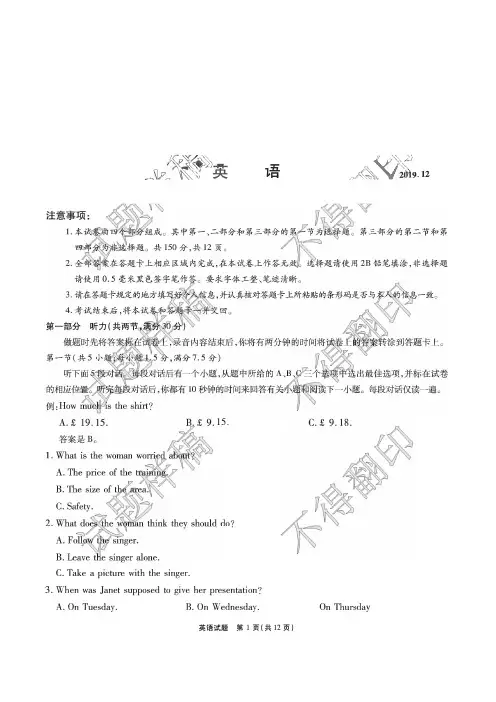
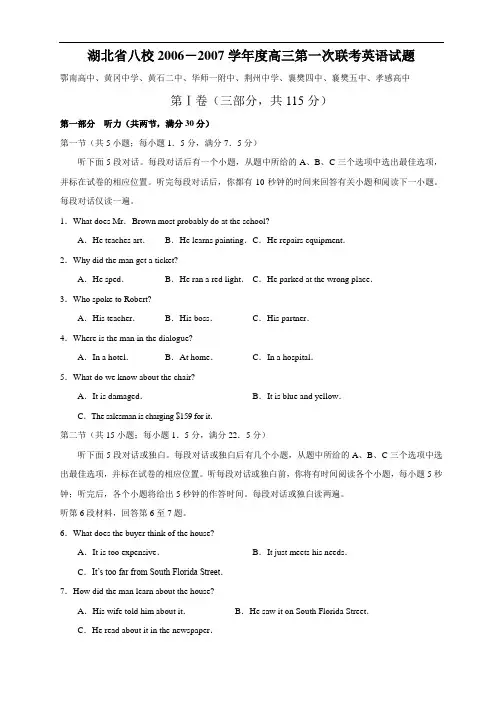
湖北省八校2006-2007学年度高三第一次联考英语试题鄂南高中、黄冈中学、黄石二中、华师一附中、荆州中学、襄樊四中、襄樊五中、孝感高中第Ⅰ卷(三部分,共115分)第一部分听力(共两节,满分30分)第一节(共5小题;每小题1.5分,满分7.5分)听下面5段对话。
每段对话后有一个小题,从题中所给的A、B、C三个选项中选出最佳选项,并标在试卷的相应位置。
听完每段对话后,你都有10秒钟的时间来回答有关小题和阅读下一小题。
每段对话仅读一遍。
1.What does Mr.Brown most probably do at the school?A.He teaches art.B.He learns painting.C.He repairs equipment.2.Why did the man get a ticket?A.He sped.B.He ran a red light. C.He parked at the wrong place.3.Who spoke to Robert?A.His teacher.B.His boss.C.His partner.4.Where is the man in the dialogue?A.In a hotel.B.At home.C.In a hospital.5.What do we know about the chair?A.It is damaged.B.It is blue and yellow.C.The salesman is charging $159 for it.第二节(共15小题;每小题1.5分,满分22.5分)听下面5段对话或独白。
每段对话或独白后有几个小题,从题中所给的A、B、C三个选项中选出最佳选项,并标在试卷的相应位置。
听每段对话或独白前,你将有时间阅读各个小题,每小题5秒钟;听完后,各个小题将给出5秒钟的作答时间。
每段对话或独白读两遍。
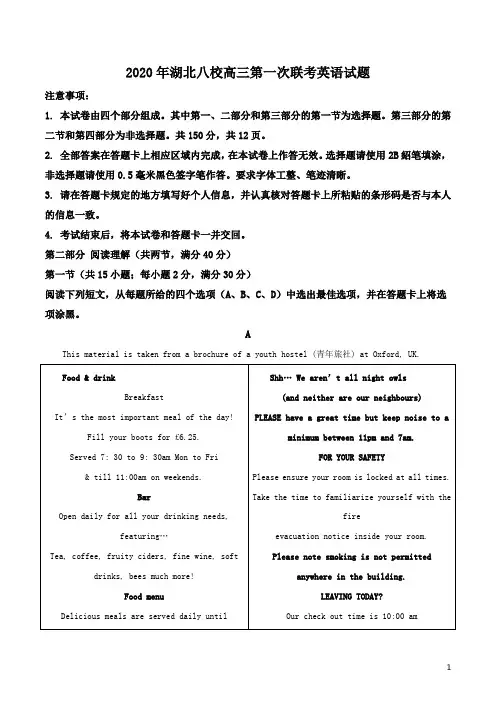
2020年湖北八校高三第一次联考英语试题注意事项:1. 本试卷由四个部分组成。
其中第一、二部分和第三部分的第一节为选择题。
第三部分的第二节和第四部分为非选择题。
共150分,共12页。
2. 全部答案在答题卡上相应区域内完成,在本试卷上作答无效。
选择题请使用2B紹笔填涂,非选择题请使用0.5毫米黑色签字笔作答。
要求字体工整、笔迹清晰。
3. 请在答题卡规定的地方填写好个人信息,并认真核对答题卡上所粘贴的条形码是否与本人的信息一致。
4. 考试结束后,将本试卷和答题卡一并交回。
第二部分阅读理解(共两节,满分40分)第一节(共15小题;每小题2分,满分30分)阅读下列短文,从每题所给的四个选项(A、B、C、D)中选出最佳选项,并在答题卡上将选项涂黑。
AThis material is taken from a brochure of a youth hostel (青年旅社) at Oxford, UK.1. On which day does this hostel still serve breakfast at 10:30?A. MondayB. ThursdayC. WednesdayD. Saturday.2. What can travelers do in this hostel?A. Throwing a party at midnightB. Smoking in the toilet.C. Having breakfast for freeD. Connecting WIFI on the ground floor.3. What time are travelers normally expected to check out?A. 10:00am.B. 7:00am.C. 9:30am.D. 11:00am.【答案】1. D 2. D 3. A【解析】1细节理解题。
根据Food & drink Breakfast Served 7: 30 to 9: 30am Mon to Fri & till 11:00am on weekends. 可知,周末早餐供应到上午11:00,故选D。
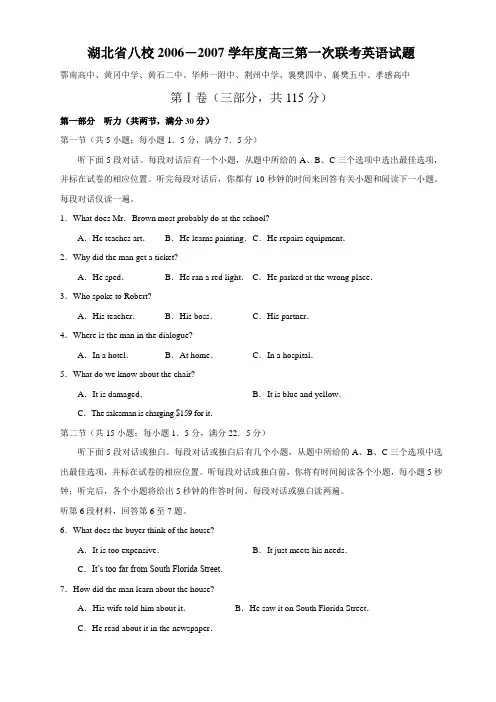
湖北省八校2006-2007学年度高三第一次联考英语试题鄂南高中、黄冈中学、黄石二中、华师一附中、荆州中学、襄樊四中、襄樊五中、孝感高中第Ⅰ卷(三部分,共115分)第一部分听力(共两节,满分30分)第一节(共5小题;每小题1.5分,满分7.5分)听下面5段对话。
每段对话后有一个小题,从题中所给的A、B、C三个选项中选出最佳选项,并标在试卷的相应位置。
听完每段对话后,你都有10秒钟的时间来回答有关小题和阅读下一小题。
每段对话仅读一遍。
1.What does Mr.Brown most probably do at the school?A.He teaches art.B.He learns painting.C.He repairs equipment.2.Why did the man get a ticket?A.He sped.B.He ran a red light. C.He parked at the wrong place.3.Who spoke to Robert?A.His teacher.B.His boss.C.His partner.4.Where is the man in the dialogue?A.In a hotel.B.At home.C.In a hospital.5.What do we know about the chair?A.It is damaged.B.It is blue and yellow.C.The salesman is charging $159 for it.第二节(共15小题;每小题1.5分,满分22.5分)听下面5段对话或独白。
每段对话或独白后有几个小题,从题中所给的A、B、C三个选项中选出最佳选项,并标在试卷的相应位置。
听每段对话或独白前,你将有时间阅读各个小题,每小题5秒钟;听完后,各个小题将给出5秒钟的作答时间。
每段对话或独白读两遍。

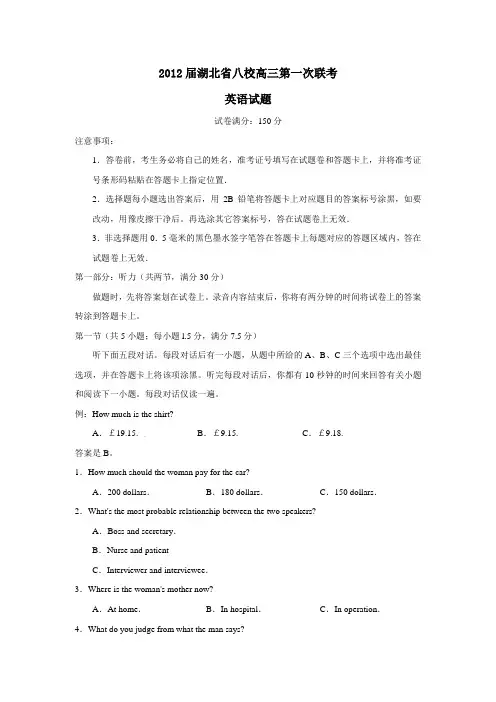
2012届湖北省八校高三第一次联考英语试题试卷满分:150分注意事项:1.答卷前,考生务必将自己的姓名,准考证号填写在试题卷和答题卡上,并将准考证号条形码粘贴在答题卡上指定位置.2.选择题每小题选出答案后,用2B铅笔将答题卡上对应题目的答案标号涂黑,如要改动,用豫皮擦干净后。
再选涂其它答案标号,答在试题卷上无效.3.非选择题用0.5毫米的黑色墨水签字笔答在答题卡上每题对应的答题区域内,答在试题卷上无效.第一部分:听力(共两节,满分30分)做题时,先将答案划在试卷上。
录音内容结束后,你将有两分钟的时间将试卷上的答案转涂到答题卡上。
第一节(共5小题;每小题l.5分,满分7.5分)听下面五段对话。
每段对话后有一小题,从题中所给的A、B、C三个选项中选出最佳选项,并在答题卡上将该项涂黑。
听完每段对话后,你都有10秒钟的时间来回答有关小题和阅读下一小题。
每段对话仅读一遍。
例:How much is the shirt?A.£19.15.B.£9.15. C.£9.18.答案是B。
1.How much should the woman pay for the car?A.200 dollars.B.180 dollars.C.150 dollars.2.What's the most probable relationship between the two speakers?A.Boss and secretary.B.Nurse and patientC.Interviewer and interviewee.3.Where is the woman's mother now?A.At home.B.In hospital.C.In operation.4.What do you judge from what the man says?A.The man is anxious to begin his studies.B.The man regrets that he was not a good student.C.The man thinks study is not important.5.Why would the woman rather stay at the hotel?A.It costs less money.B.It saves much labor.C.It feels more comfortable.第二节(共15小题;每小题1.5分,满分22.5分)听下面5段对话或独白。
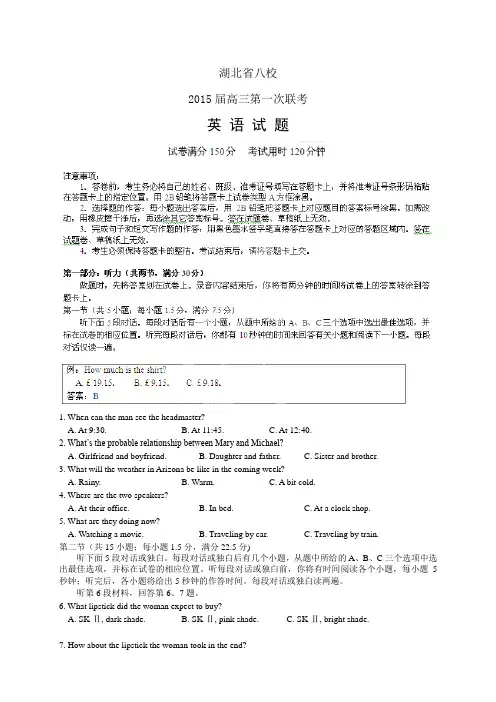
湖北省八校2015届高三第一次联考英语试题1. When can the man see the headmaster?A. At 9:30.B. At 11:45.C. At 12:40.2. What’s the probable relationship between Mary and Michael?A. Girlfriend and boyfriend.B. Daughter and father.C. Sister and brother.3. What will the weather in Arizona be like in the coming week?A. Rainy.B. Warm.C. A bit cold.4. Where are the two speakers?A. At their office.B. In bed.C. At a clock shop.5. What are they doing now?A. Watching a movie.B. Traveling by car.C. Traveling by train.第二节(共15小题;每小题1.5分,满分22.5分)听下面5段对话或独白。
每段对话或独白后有几个小题,从题中所给的A、B、C三个选项中选出最佳选项,并标在试卷的相应位置。
听每段对话或独白前,你将有时间阅读各个小题,每小题5秒钟;听完后,各小题将给出5秒钟的作答时间。
每段对话或独白读两遍。
听第6段材料,回答第6、7题。
6. What lipstick did the woman expect to buy?A. SK-Ⅱ, dark shade.B. SK-Ⅱ, pink shade.C. SK-Ⅱ, bright shade.7. How about the lipstick the woman took in the end?A. Its color is suitable but is very expensive.B. Its color is right though it is not SK-Ⅱ brand.C. Its color isn't right but its brand is SK-Ⅱ.听第7段材料,回答第8至10题。
湖北省八市2011届高三上学期第一次联考英语试卷本试题分四部分,满分150分,考试时间120分钟。
第一部分: 听力(共两节, 满分30分)第一节(共5小题;每小题1.5分,满分7.5分)听下面五段对话。
每段对话后有一个小题,从题中所给的A、B、C三个选项中选出最佳选项,并标在试卷的相应位置。
听完每段对话后,你都有10秒钟的时间来回答有关小题和阅读下一小题,每段对话仅读一遍。
1.What time does the BBC news end ?A.At 6:30.B.At 7:00.C.At 7:30.2.How did the woman know the traffic accident?A.She saw it on TV.B.She read about it.C.She witnessed it.3.Why can’t the man help the woman ?A.Because he will be leaving soon.B.Because he is too busy to do so.C.Be cause he doesn’t know how to help her.4.Who is the man?A.Tom’s boss.B.Tom’s doctor.C.The woman’s doctor.5.What will the man do next Monday morning ?A.He will fly to New York to buy some equipment for the company.B.He will go to the airport to see his manager off.C.He will go to New York with his manager on a business trip.第二节(共15小题;每小题1.5分,满分22.5分)听下面几段对话或独白。
20XX年中学测试中学试题试卷科目:年级:考点:监考老师:日期:20XX-2021学年度湖北省八校高三年级第一次联考英语试题本试卷共四部分, 满分150分。
考试时间120分钟。
第一部分听力(共两节,满分30分)第一节(共5小题,每小题1.5分,满分7.5分)听下面5段对话。
每段对话后有一个小题,从题中所给的A、B、C三个选项中选出最佳选项,并标在试卷的相应位置。
听完每段对话后,你都有l 0秒钟的时间来回答有关小题和阅读下一小题。
每段对话仅读一遍。
1.How many countries has the man traveled overseas to?A.three. B.Four.C.Five.2.What did the man do?A.Looked at the windows.B.Cleaned the windows.C.Cleaned the house.3.Why did the woman apologize to the man?A.She waited for him too long.B.She was late for coming.C.She couldn’t come.4.What does the man say about Marilyn?A.She was a proper controller.B.She pretended she was happy.C.She was extremely pleased.5.What does the man imply?A.He will continue his work on vacation.B.Papers piled while he was on vacation.C.He has too much work to do.第二节(共15小题;每小题1.5分,满分22.5分)听下面5段对话或独白。
每段对话或独白后有几个小题,从题中所给的A、B、C三个选项中选出最佳选项,并标在试卷的相应位置。
湖北省八校2020届高三第一次联考英语试题第一部分听力(共两节,满分30分)第一节(共5小题;每小题1.5分,满分7.5分)听下面5段对话。
每段对话后有一个小题,从题中所给的A、B、C三个选项中选出最佳选项,并标在试卷的相应位置。
听完每段对话后,你都有秒钟的时间来回答有关小题和阅读下一小题。
每段对话仅读一遍。
例:How much is the shirt?A. £19.15.B. £ 9.15.C. £9.18.答案是B。
1. What is the woman worried about?A. The price of the training.B. The size of the area.C. Safety.2. What does the woman think they should do?A. Follow the singer.B. Leave the singer alone.C. Take a picture with the singer.3. When was Janet supposed to give her presentation?A. On Tuesday.B. On Wednesday.C. On Thursday.4. What is the conversation mainly about?A. A pair of boots.B. The man’s grandfather.C. A new mall.5. What are the speakers doing?A. Visiting a friend’s place.B. Hunting for a new house.C. Decorating their kitchen.第二节(共15小题;每小题1.5分,满分22.5分)听下面5段对话或独白,每段对话或独白后有几个小题,从题中所给的A、B、C三个选项中选出最佳选项,并标在试卷的相应位置。
2009 届 高 三 第 一 次 联 考英 语 试 题第一部分:听力(共两节,满分30分)做题时,先将答案划在试卷上 ,录音内容结束后,你将有两分钟时间将试卷上的答案转涂到答题卡上。
第一节(共5小题;每小题1.5分,满分7.5分)听下面5段对话。
每段对话后有一个小题,从题中所给的A 、B 、C 三个选项中选出最佳选项,并标在试卷的相应位置。
听完每段对话后,你都有10秒钟的时间来回答有关小题和阅读下一小题。
每段对话仅读一遍。
例:How much is the shirt?A .£19.15.B .£9.15.C .£9.18.答案是B1.Where will the woman stop on her way?A .At the gas station.B .At Aunt Mary’s .C .At a cigarette shop.2.What’s the most probable relationship between the two speakers?A .Boss and secretary.B .Nurse and patient.C .Teacher and student.3.Why is the man going to the post office?A .To mail a letter.B .To buy some stamps.C .To get a package.4.What can we learn from the conversation?A .The woman has made progress in her study.B .The professor has completed his task with t he woman’s help.C .The professor has helped the woman a lot in passing the exam.5.What does the man imply?A .The woman won’t lose weight anyway.B .Losing weight is dangerous for her health.C .The woman had better use some other way to lose weight.第二节 (共15小题;每题1.5分,满分22.5分)听下面5段对话或独白。
2011届高三第一次联考英语试题考试时间:2010年12月31日下午15∶00 ~17∶00全卷满分150分。
考试用时120分钟。
第一部分:听力(共两节,满分30分)做题时,先将答案划在试卷上。
录音内容结束后,你将有两分钟的时间将试卷上的答案转涂到答题卡上。
第一节(共5小题;每小题1.5分,满分7.5分)听下面5段对话。
每段对话后有一个小题,从题中所给的A、B、C三个选项中选出最佳选项,并标在试卷的相应位置。
听完每段对话后,你都有10秒钟的时间来回答有关小题和阅读下一小题。
每段对话仅读一遍。
例:How much is the shirt?A. £19.15.B. £9.15.C. £9.18.答案是B。
1. What do they mainly talk about?A. The rain.B. The jacket.C. The weather.2. What can we infer from the talk?A. The woman is on vacation now.B. The woman is a little worried.C. The woman is not eager to find a job.3. What did the woman do just after high school?A. She played in a band.B. She started a new company.C. She worked as a saleswoman.4. How much will the woman lend the man?A. 6 dollars.B. 7 dollars.C. 4 dollars.5. What does the man offer to do?A. Call her a taxi.B. Telephone Lisa.C. Ride his car.第二节(共15小题;每小题1.5分,满分22.5分)听下面5段对话或独白。
湖北省八校2015届高三英语第一次联考试题(含解析)【试卷综评】本试卷以新课标为指导,单项选择题目知识覆盖面广、考查知识点灵活。
完形填空,旨在考查学生的基础知识应用能力。
阅读理解选材具有时代性,紧密联系生活实际,选项设计灵活合理,注重考查学生的阅读理解能力。
完成句子考查学生的基础知识掌握和应用能力。
书面表达联系实际以把如何和别人融洽相处为题,考查学生的英语实际运用能力。
总之,本次联考试试卷难度适中,是一份质量很高的试卷。
1. When can the man see the headmaster?A. At 9:30.B. At 11:45.C. At 12:40.2. What’s the probable relationship between Mary and Michael?A. Girlfriend and boyfriend.B. Daughter and father.C. Sister andbrother.3. What will the weather in Arizona be like in the coming week?A. Rainy.B. Warm.C. A bit cold.4. Where are the two speakers?A. At their office.B. In bed.C. At a clockshop.5. What are they doing now?A. Watching a movie.B. Traveling by car.C. Traveling bytrain.第二节(共15小题;每小题1.5分,满分22.5分)听下面5段对话或独白。
每段对话或独白后有几个小题,从题中所给的A、B、C三个选项中选出最佳选项,并标在试卷的相应位置。
听每段对话或独白前,你将有时间阅读各个小题,每小题5秒钟;听完后,各小题将给出5秒钟的作答时间。
2019届湖北省八校高三第一次联考英语试题第二部分阅读理解(共两节,满分40分)第一节(共15小题;每小题2分,满分30分)阅读下列短文,从每题所给的四个选项(A、B、C和D)中,选出最佳选项,并在答题卡上将该项涂黑。
ATraveling to a foreign country can make you frightened if you don’t know the local language. Mr. Thibault has a number of tips to help travelers manage in a destination when they don’t speak the native tongue, based on his own experience. Here are a few of them.Download a Language Translation AppMr. Thibault tends to rely on Google Translate and suggests that travelers find an app that works for them. Ideally, find one that specializes in the language you need to translate especially if the language uses a character set you’re not familiar with, or have difficulty pronouncing.Speak with Your Hands and HeadPointing with your hands and nodding or shaking your head, Mr. Thibault said, are easy ways to communicate with locals in the country you’re in. “Gestures are all universally understood,” he said.Learn a Few Key WordsKnowing basic words and phrases like “hello,” “thank you” and “I’m sorry, I don’t speak your language, do you speak English?” is a must, Mr. Thibault said. Showing that you care enough to learn some of the language before you go, and at least enough to acknowledge that you don’t know more, is a form of respect and will go a long way to be liked by locals.Work with a Local Travel AgentIf you feel particularly uncomfortable in the country you’re headed to, and you have to go anyway, relying on a local travel agent who knows both your and your destination’s language can be incredibly useful.Hire a Local Tour GuideA tour guide can help you get a better grasp of the local language and is a good person to practice words and phrases with. Whenever Mr. Thibault visits a new country, he books a sightseeing tour with a guide on t he first day of his trip. “I use this day to learn about my destination and get familiar with the language,” he said.21. In what situation should a language translation app be applied while traveling abroad?A. When you have trouble pronouncing the words.B. When you want to acknowledge your ignorance.C. When you want to practice the local language.D. When you feel uncomfortable in the country.22. What is the easiest way to communicate with foreigners according to the text?A. Downloading a language translation app.B. Learning a few key words.C. Using body language.D. Working with a guide.23. How can you better understand the local language?A. By speaking with your hands and head.B. By learning a few key words.C. By downloading a language translation app.D. By hiring a local tour guide.BA New Jersey couple and a homeless man have been accused of making up a feel-good story that raised more than $400,000 through GoFundMe.The couple, Kate McClure and Mark D’Amico, and the man, Johnny Bobbitt Jr., face a charge of second-degree theft, Burlington County Prosecutor Scott Coffina said Thursday.The couple said they met Bobbitt when he gave his last $20 to McClure, who was stranded on Interstate 95 in Philadelphia, so she could put gas in her car, then started the GoFundMe campaign as a way to thank him.The paying-it-forward story that drove this fundraiser might seem too good to be true, Coffina said at a press conference.Unfortunately, it was. The entire campaign was based on a lie.After fees, the money of the campaign netted about $367,000, all depos ited into McClure’s accounts, Coffina said. Bobbitt received $75,000, and within months McClure and D’Amico had wasted their share on buying a car, high-end handbags and trips, Coffina said. They also used it at casinos(赌场), he said.Coffina stressed that while Bobbitt, a veteran(退伍老兵), deserves thanks for his service to the country and sympathy for his situation; he was fully involved in the crime, making media appearances to help "promote the dishonest campaign."According to Coffina, McClure and D’Amico first met Bobbitt at an off-ramp(驶出匝道)near a casino they regularly went, at least a month before the GoFundMe campaign went live.They went back to the spot a month later, Coffina said. D’Amico took a picture of McClure and Bobbitt that became the face of the GoFundMe campaign that they started hours later,Coffina said.24. What the actual purpose GoFundMe campaign started by the couple?A. To express thei r appreciation for Bobbitt’s help.B. To help Bobbitt pay off his heavy debt.C. To raise money for their own benefit.D. To make people believe in Bobbitt’s generosity.25. What does the underlined word “stranded” in Paragraph 3 mean?A. Impossible to finish.B. Unable to move.C. Without any choice.D. Out of service.26. How much money did the couple get from the cheating GoFundMe campaign?A. About $ 292,000.B. About $ 367,000.C. About $325,000.D. About $ 400,000.27. What was Bobbitt accused of?A. Pretending to be a veteran.B. Robbing the couple of $75,000.C. Failing to serve his country.D. Helping invent the story.CI’m an American Born Chinese. I wouldn’t say I’m more American than Chinese or vice versa. My character was equally molded by both cultures. For a long time, I was comfortable with being from two cultures. I was fluent in “Chinglish”.However, as I grew up, something unexpected rose, causing a parallel tension between the two corresponding cultures. During Chinese events when I was in China, the host would sometimes make fun of America. My relatives would look at me and laugh, asking me how I felt. But how could I respond to a question like that? If I said I was uncomfortable, it would just make me s eem even more American in their eyes. But I couldn’t pretend to laugh either. So, I often just stayed quiet and smiled.Sometimes, I’d leave China feeling less Chinese than when I went in.This past summer, on my way back to Rochester, a man at the airport kept asking my father and I where we were from. When I told him I was from the United States, he didn’t seem to believe me.He then went on to ask the terrible question, “But like where are you really from, like, where were you born?” And no matter how specific our answer was, the man still seemed a little doubtful. He then went on to ask us if we knew where Tampa, Florida was and if we knew anything about it. It’s moments like these when I realize that sometimes my appearance makes it hard for me to seem fully American.These experiences made me question if I was more Chinese or American.I felt like I was neither. So, if I wasn’t completely one culture or the other, what was I? In China, I would feel more American, while in America, I would feel more Chinese There was no balance between my two cultures.But this doesn’t mean that I don’t embrace both my identities. I love both my Chinese cultural identity and my American one. I just need to learn to love them together.28. How did the author feel about his identity at the very beginning?A. Special.B. Confident.C. Confused.D. Ridiculous.29. Why did the author feel less Chinese when he left China?A. Because he found it hard to remain quiet and keep smile.B. Because he was unable to speak fluent Chinese at his hometown.C. Because he had lost his face in front of his relatives and friends.D. Because he was treated as an American by his Chinese relatives.30. What made the man at the airport keep questioning where the author was from?A. His cultures.B. His experience.C. His look.D. His air tickets.31. What could be the best title of the passage?A. Being culturally homeless.B. A Boy with two identities.C. A Chinese boy born in America.D. Better Chinese than American.DPesticides(杀虫剂) might just be a bee's worst enemy. They harm their brains, slow down their reproduction, and even kill their buzz. Now it seems they damage their social lives and reduce their ability to care for their young.While previous studies have shown that commonly used neonicotinoid(新烟碱类)pesticides make bees sick and affect how they search for food and navigate, a new study gives more of an idea of how these chemicals affect the internal workings of a colony. Studying these effects has proved difficult, so the team employed a new technique. They stuck tiny QR codes to the backs of bumblebees and tracked their movements using a robotic camera.The researchers looked at 12 colonies housed in a lab, giving some the same level of imidacloprid – the world's most commonly used pesticide –that they’d be exposed to in the wild while keeping others pesticide-free as controls. They checked on them for a few minutes 12 times a day. The findings are published in the journal Science.Unfortunately, the researchers found a number of obvious differences between the bees exposed to the pesticide and the controls. The bees given neonicotinoids spent less time interacting with other bees and more time resting. This lull(间歇期)in activity tended to happen more at night, but the researchers aren’t sure why."Bees actually have a very strong circadian rhythm(生理节律)," lead author James Crallexplained in a statement. "So what we found was that, during the day, there was no statistically observable effect, but at night, we could see that they were crashing. We don't know yet whether the pesticides aredestroying circadian gene regulation or if this is just some, maybe physiological feedback... but it suggests that, just from a practical perspective, if we want to understand or study these compounds, looking at effects overnight matters a lot."32. What happened to the bees exposed to the pesticide at night?A. They forgot to feed the young.B. They preferred communicating more.C. They lost the ability to rest.D. They remained less active.33. How was the research conducted?A. By making comparisons.B. By collecting information.C. By asking questions.D. By analyzing the data.34. What does the underlined word “controls” refer to?A. The tools used to observe the bees.B. The bees without being exposed to the pesticide.C. The researchers taking charge of the experiments.D. The data recorded by the robotic camera.35. What’s the purpose of the article?A. To call for the toughest ban on the chemicals.B. To check the best time to observe experimental results.C. To inform people of the worrying effects of pesticides.D. To recommend measures to improve the quality of pesticides.第二节(共5小题;每小题2分,满分10 分)根据短文内容,从短文后的选项中选出能填入空白处的最佳选项。